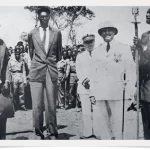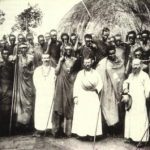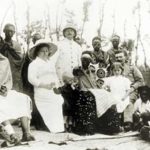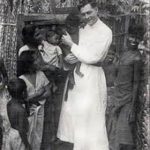The Dilemma of Proselytization
During their first years in Rwanda, the Fathers asked a different kind of service from the people in their vicinity, one that previous authorities had never demanded. Anxious to win converts, the missionaries and their catechists visited the neighboring bills to urge the Hutu to come to the mission for instruction. However, in many cases they overstepped the line separating encouragement from requirement, sometimes inadvertently but more often purposely. As the Father Superior of Save wrote in March 1902:
“It is indeed certain that with the Negroes more than with others, salvator which inspires trust is necessary, but also fortiter which inspires fear is required, because if one does not push them a little (compelle intrare [the Latin actually means to force them to enter]) they will greatly delay the moment of their conversion.”
This pressure rather than any enthusiasm for the new religion brought many Hutu to the missions. A Father at Save lamented, “[we have] very many who have taken instruction, very many who came to the mission [but] . . rather few, perhaps 300, show themselves to be frankly for God.” Indeed, many who were studying the catechism continued to perform the ceremonies of the Imandwa belief system.
After a visit to the Rwandan missions in 1903, Monsignor Hirth decided that the Fathers had been relying too much on pressure in making converts. He ordered them to withdraw the catechists whom they had placed on neighboring hills, to send home catechists who came from outside Rwanda, and to permit only informal proselytization by Rwandan converts among their own relatives and friends. This more gradual approach was itself abandoned after 1907, perhaps because the arrival of a contingent of Protestant missionaries in that year stimulated fears of losing large numbers of Rwandans to the “heretical” faith. Once more, the Fathers began calling at the homes of the Rwandans; once more, they obtained small holdings on the more distant hills wheretheir catechists could live and teach those who found it difficult to come often to the mission. This system of pressure operated efficiently for years, although it was severely criticized by the Regional Superior of the order:
The Negroes are often inclined to believe that [those] . . . who come to us to receive religious instruction are thus fulfilling a duty [corvée]. which is due to us, like requisitions of a different kind are due to temporal chiefs, native or European. . . Catechists, tempted to see themselves as soldiers or agents of government, are sent by the missionaries into the villages to gather the inhabitants together voluntarily or by force to give them instruction for which they feel no need and which they are not in the least disposed to receive…. Nor is it rare for the pressure and use of force to come directly from the missionaries who automatically register children and young people…and even old people for catechism or school, oblige them to come to the mission on certain days, and become angry when the drafted recruits lack the desired assiduity and even have recourse ta violent methods to obtain this assiduity.
As the Superior concluded, the system would “win no hearts,” but it did substantially increase attendance at the missions. Rwandans called this aggressive proselytizationgutora, “to select” or “to choose out.” Gutora had customarily described a mutware’s selection of the young men who were to be his ntore, the elite warriors of his regiment. To be chosen might mean wealth and prestige; but in any case, the invitation could not be refused. In the same way, the Hutu did not dare refuse out-right “selection” by the Fathers. Rather they tried simply to disappear or to hide their children when the missionaries or their men were seen approaching. Or they pleaded illness or extra work as excuses to stay at home. When the Hutu could find no excuse, they acquiesced in studying the tenets of the faith or the letters of the alphabet as they accepted cultivating for their traditional superiors or doing obligatory labor at the mission.
Nor did the notables usually openly oppose the Fathers’ attempts at converting their subjects, bitterly though they resented them. They knew that Hutu who began instruction would soon regard the Fathers as patrons. When the notables were obliged to provide laborers for the mission, they could take some comfort in this use of their men being temporary and occasional. But when the Fathers began pressing people to come for instruction, the notables knew that they were exacting a more permanent commitment for regular attendance at the mission.
Since each notable measured his prestige in terms of the number of men he commanded and computed his wealth partly in terms of the amount of service that he could get from them, the required religious instruction challenged their power even more drastically than did the Fathers’ requisition of laborers.
By the time the gutora system was in full effect just before World War I, some notables were seeking to preserve part of their power by compromising with the Fathers. They offered to divide their men with the missionaries, as batware had customarily shared their subjects with newly appointed rivals who were seeking men to expand recently established regiments: if the notables sent all the men from one hill for instruction, the Fathers would agree not to proselytize on another. But the missionaries, true to their perceived duty to convert all, steadfastly refused such arrangements. Relying on German orders that each man was free to take instruction, they continued to exert pressure that guaranteed that all who wished to convert and many who did not would attend their classes. When forced into a confrontation with the Fathers over the issue, notables publicly ordered that any of their subjects who wished to take instruction could do so; then they exercised their imagination to the full, devising ways secretly to impede the Hutu from complying with the Fathers’ invitations.”
Throughout Rwanda the Fathers exerted pressure both to satisfy their material needs and to oblige the Hutu to learn their dogma. In the out-lying areas where the control of the Court was not yet well established – at Mibirizi, Rwaza, Zaza, Murunda, and Rulindo – the missionaries demonstrated their power even more directly. Either from a desire to help their followers or from a sense of obligation to keep the peace, they frequently became entangled in local disputes within or between lineages or between Court notables and their subjects. They also found it necessary to defend their property or messengers from attack in these areas where even notables sometimes could not travel freely. The Fathers themselves owned and used guns. In addition, during the early years, several stations employed armed East African guards to assist the Fathers in defending the mission or in keeping order in the region. When the Fathers at Rwaza set out to punish those who had attacked the mission in 1904, their small contingent was joined by large mobs of people from the neighboring hills who were eager for the opportunity to plunder under cover of the Fathers’ guns. Fathers at other stations almost invariably attracted similar support whenever they attacked Hutu who had harmed the interests of the mission or who persisted in troubling their neighbors. In somecases the missionaries actively encouraged such groups to join them, summoning them with the customary sounds of drum and horn that announced warfare; sometimes they just could not prevent the mobs from following them. Unable to control these volunteers, the Fathers stood by while they pillaged the supposedly guilty parties to their own satisfaction. Some of the first adherents of the Rwaza mission recalled that the prospect of pillage was the major force attracting the early supporters of the mission.
https://uk.amateka.net/the-dilemma-of-proselytization/https://uk.amateka.net/wp-content/uploads/2022/12/rwanda_urundi.jpghttps://uk.amateka.net/wp-content/uploads/2022/12/rwanda_urundi-150x150.jpgChurch and RevolutionMissionary historyDuring their first years in Rwanda, the Fathers asked a different kind of service from the people in their vicinity, one that previous authorities had never demanded. Anxious to win converts, the missionaries and their catechists visited the neighboring bills to urge the Hutu to come to the mission...BarataBarata rpierre@ikaze.netAdministratorAMATEKA | HISTORY OF RWANDA




